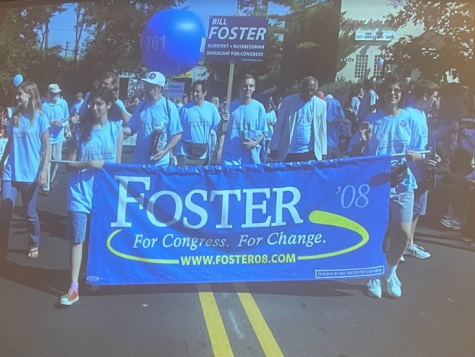The hunt for an ACT/SAT test
It’s just before 6 A.M. on Saturday, Oct. 3 and Naperville North senior Meaghan Murphy is already up. She is driving to Indiana to take the SAT, after her past four test dates were cancelled because of the COVID-19 pandemic. She leaves early so that she has time to stop and get a black coffee from Dunkin’ Donuts, but as is normally the case when she is nervous, she doesn’t drink more than a few sips. As she drives she watches the sky turn from dark black to a cloudy

grey, the chorus of Sarah Bareilles Brave, her go-to song before anything stressful, playing in the background. Once she enters her testing room, her procter asks the students where they are from. Instead of responding with the usual surrounding high schools, or even districts, they respond with surrounding states— Illinois, Ohio, Michigan, Wisconsin.
Murphy’s worry of catching the coronavirus from students traveling out of state is eased by the safety precautions she has taken. She is wearing both a surgical mask and a cloth mask, she has her travel sized hand sanitizer at the ready and she is determined not to use the bathroom inside the school to avoid unnecessary germs. Her goal is to protect both herself and her family, especially her mom who works in a hospital, from the virus.
The pandemic has added a multi-state game of “Find the Open Testing Site” to the already intensive process of college admissions.The lack of test accessibility has also forced numerous colleges to adopt test-optional policies, but students, skeptical of such guarantees, continue to seek out ways to take the tests anway.
“How can they all of a sudden be test optional especially when that was something that used to weigh so heavily,” Murphy said.
Standardized tests have been used for many years, not just in the college admissions process, but as a measure of intelligence. Society has often taken a quantitative approach to defining intellect, basing it off things such as standardized tests, GPAs and IQs. Consequently, it’s understandable that many students are unsure of how colleges will be able gauge their level of intelligence without them.
Naperville North College and Career Counselor Brian La Porte says that test optional policies are designed to help, not hurt students. Colleges know that this has been a difficult year for just about everyone, and they are hoping to relieve some of the stress that comes with the college application process.
“By offering a test optional policy, colleges and universities are trying to show compassion and understanding for students impacted by the pandemic, either directly or indirectly – while at the same time, giving themselves the best possible opportunity to bring in a full freshman class for fall 2021,” La Porte said.
Further, La Porte notes that if a college or university has adopted a test optional policy, students who choose not to submit a test score will not be negatively impacted in the admissions process. Instead, schools will put more weight on other factors.
“Colleges & universities that I’ve spoken to this year have all said that students who do not send scores will have their GPA and course selection more closely looked at for admissions consideration,” La Porte said.
Some students, like Naperville North senior Maisie Li, were happy with the idea of schools going test optional, but still chose to pursue testing opportunities despite the challenges. After several of her test dates were cancelled, Maisie ended up taking an ACT in the banquet room of a hotel, surrounded by 45 other students who had also been informed at the last minute that their testing location had changed from a school to a hotel.
“I would rather take it in weird conditions than not take it at all,” Li said.
If students have concerns or questions about a school’s policies, the best place to go is always the school itself. Spotlight College Advising founder and college consultant Shelly O’Neill says that it is a good idea to reach out to the local admissions representative of the school you are interested in to ask questions about their specific policies. Contacting admissions can also be helpful in determining if test scores will be used in the financial aid process.
“You may have decided to go test optional but have a test score that can qualify you for a scholarship, so it’s critical to determine which factors each school will use for distributing their merit,” O’Neill said.
According to The National Center for Fair and Open Testing, more than half of all four year colleges and universities will be test optional for applying this year, for a total of 1,665 schools.
It’s also important to remember that college admissions are not a one-sided process; they require work from both students and schools. Test optional policies are intended to help students who were not able to have the opportunity to test safely, which in turn helps colleges recruit a full incoming class.
“Honesty and integrity are expected in your admission materials, so it would be appropriate to expect that colleges uphold the same standard. If a school indicates test optional, then it is assumed they will not look unfavorably,” O’Neill said.
While the pandemic has made them more prominent, test optional policies are nothing new. Many colleges had policies like this in place long before the pandemic struck. Standardized tests are not cheap and test optional policies can help relieve a little of the financial burden the college process brings. The University of California voted in May to remove their requirement for ACT/SAT test scores until at least fall of 2024, as they are hoping to create a test that more accurately reflects the values and knowledge they want their students to possess. If other schools follow their example, it’s possible that these policies could extend long after the pandemic is over.
“I definitely see colleges open to the idea of extending test optional policies, especially if it provides them the opportunity to a fair applicant pool,” La Porte said.

Nora Fitzgerald is a senior and first-time staff member of The North Star. She is excited to explore the world of journalism and further develop herself...










